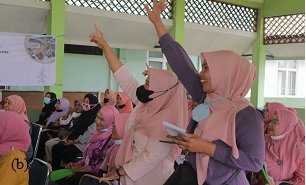Edukasi melalui Buku Saku dan Video Animasi Diabetes Mellitus terhadap Kader Prolanis Kota Pontianak Education through Pocket Book and Video of Diabetes Mellitus towards Non-Medical Officer of Pontianak City
Main Article Content
Abstract
The prevalence of diabetes mellitus (DM) was increased in Pontianak. The Technical Implementation Unit (UPT) of Puskesmas Perumnas II, as one of the primary health centers in Pontianak, has applied the Diabetes Mellitus Chronic Disease Management Program (Prolanis) to overcome this problem. The Puskesmas Perumnas II involves non-medical workers through training to serve as officers who assist in implementing the Prolanis program. In this program, Pharmacists provide knowledge for non-medical workers through education and counseling related to DM treatment. In this community service activity (PKM), we aim to educate these non-health officers of Prolanis in Puskesmas Perumnas II regarding the knowledge of prevention and management of diabetes mellitus. As the method, we prepared the timeline activity, including orientation and coordination with Puskesmas Perumnas II, selecting the non-health officers of Prolanis as the participants, providing the materials (pocketbook and video), implementation of activities (conducting pre-tests, materials, and media transfers to participants, discussions, debriefings, post-tests, and evaluation through questionnaires), and data analysis. We found that participants' knowledge was increased related to DM and its treatment based on the average of pre-test and post-test results, such as 59.75 and 73.25, respectively. Evaluation of this education method through questionnaires showed that participants felt the material provided was very interesting, and participants gained new knowledge through the educational media provided.
Downloads
Article Details

This work is licensed under a Creative Commons Attribution-ShareAlike 4.0 International License.
Authors who publish with this journal agree to the following terms:
- Any article on the copyright is retained by the author(s).
- Author grant the journal, right of first publication with the work simultaneously licensed under a Creative Commons Attribution License that allows others to share work with acknowledgment of the work authors and initial publications in this journal.
- Authors are able to enter into a separate, additional contractual arrangements for non-exclusive distribution of published articles of work (eg, post-institutional repository) or publish it in a book, with acknowledgment of its initial publication in this journal.
- Authors are permitted and encouraged to post their work online (e.g., in institutional repositories or on their websites) prior to and during the submission process, as can lead to productive exchanges, as well as earlier and greater citation of published work.
- The article and any associated published material is distributed under the Creative Commons Attribution-ShareAlike 4.0 International License
References
Badan Penyelenggara Jaminan Sosial. (2016). Panduan Praktis PROLANIS (Program Pengelolaan Penyakit Kronis). Jakarta: Badan Penyelenggara Jaminan Sosial Kesehatan.
Decroli, E. (2019). Diabetes Melitus Tipe 2. Padang: Pusat Penerbitan Bagian Ilmu Penyakit Dalam Fakultas Kedokteran Universitas Andalas.
Dinas Kesehatan Kota Pontianak. (2016). Data penderita Diabetes Mellitus Kota Pontianak tahun 2014. https://data.pontianak.go.id/dataset/data-kasus-diabetes-melitus/resource/cbd2757d-c07e-4f8d-8267-3939fbca3ee0
International Diabetes Federation. (2015). Diabetes in Western Pacific. Diabetes Atlas 2014. https://diabetesatlas.org/
Makkiawouda, F. O., Elmukashfi, T. A., & Al-tom, S.A.H. (2014). Effects of Health Education of Diabetic Patient's Knowledge at Diabetic Health Centers, Khartoum State, Sudan: 2007-2010. Global Journal of Health Science, 6(2), 221–226. https://doi.org/10.5539/gjhs.v6n2p221
Micha, R., Peñalvo, J. L., Cudhea, F., Imamura, F., Rehm, C. D., & Mozaffarian, D. (2017). Association Between Dietary Factors and Mortality from Heart Disease, Stroke, and Type 2 Diabetes in the United States. JAMA, 317(9): 912–924. https://doi.org/10.1001/jama.2017.0947
Mitra, M. (2019). Meningkatkan Status Gizi Balita Melalui Praktek Pengolahan Makanan Pendamping ASI Buatan Sendiri. Dinamisia: Jurnal Pengabdian Kepada Masyarakat, 3, 208–213. https://doi.org/10.31849/dinamisia.v3i0.4169
Paramarta, I. B. S., Sudarma, M., & Swamardika, I. B. A. (2017). Perancangan Aplikasi Sistem Informasi Medis Menggunakan Barcode Berbasis Desktop dan Android. Jurnal SPEKTRUM, 4(2), 16-25. http://dx.doi.org/10.24843/SPEKTRUM.2017.v04.i02.p03
Sari C. W. M. & Yamin, A. (2018). Edukasi Berbasis Masyarakat untuk Deteksi Dini Diabetes Melitus Tipe 2. Media Karya Kesehatan, 1(1). 29-38. https://doi.org/10.24198/mkk.v1i1.17127
Soelistijo, S. A., Novida, H., Rudijanto, A., Soewondo, P., Suastika, K., Manaf, A., et al. (2015). Konsensus Pengelolaan dan Pencegahan Diabetes Melitus Tipe 2 di Indonesia. Jakarta: PB Perkeni.
World Health Organization. (2016). Global Report on Diabetes mellitus. Paris: WHO Press.
